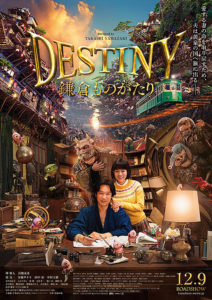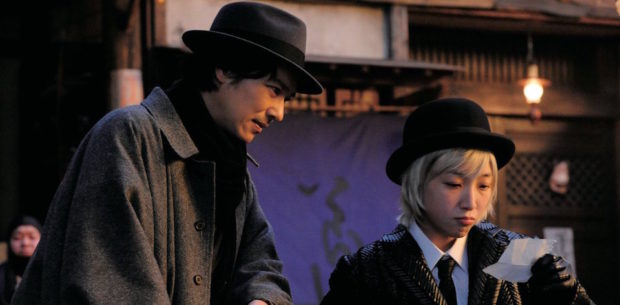Kamakura. Beaches. Temples. Giant Buddha. Mythical creatures living alongside humanity. That last one may not be found on japan-guide.com or in your Wallpaper handbook, but it’s the basis of director Takashi Yamakazi’s DESTINY: THE TALE OF KAMAKURA (鎌倉ものがたり).
Based on the manga Ryohei Saigan, the basic setup sees the recently married Akiko (Mitsuki Takahata) join her much older husband Masakazu Isshiki (Masato Sakai) in the titular Kamakura. As a writer, Masakazu is frequently called upon as a consulting detective in local spectral cases. When a mystery presents itself, he is on the case and Akiko is drawn deep into the mystical surrounds.
Yamazaki has previously adapted Saigan’s manga into the Always: Sunset on Third Street series, and there’s a similarly carefree charm to to this entry. Trading nostalgia for a more overt magical sheen, DESTINY is in no particular hurry to get where it is going. Indeed, much of the first two acts of the film merely introduce us to the local colour and set up the rules of the alternate Kamakura.
In one scene, Akiko is cooking up mushrooms purchased from a local shop, only to find her husband’s spirit trying to leave his body. Masakazu’s troubled relationship with his parents serves up a separate mystery to be solved. Another extended subplot sees a jinx god haunting their home and bringing bad luck. Similarly, the always wonderful Sakura Ando plays it up as the Grim Reaper in yet another running thread. In this sense, this adaptation might have worked better as a television series, but it’s a testament to Yamazaki’s adapted screenplay that it all still feels cohesive.
The special effects are on par with most ‘big’ budget Japanese productions. They might never be as large-scale as a Hollywood equivalent, but there’s always something going on to remind you this is not the Kamakura you know. Nevertheless, the lion’s share of the CG work is used in the final act and it’s seriously pretty. The Afterworld backgrounds are often breathtaking and a climactic train chase across a disappearing foundation is still a thrill.
Yet planet-shaking moments were never the goal here, and this climax merely acts to tie up the many stories presented in the first half. More than anything, DESTINY is a charming love story set inside a storybook version of Japan. If that sends you back in search of the source material, or leaves you with a smile on your face, then it has more than successfully done its job.
[stextbox id=”grey” bgcolor=”F2F2F2″ mleft=”5″ mright=”5″ image=”null”] 2018 | Japan | DIR: Takashi Yamakazi | WRITERS:Takashi Yamakazi, Ryohei Saigan (manga) | CAST: Mitsuki Takahata, Masato Sakai, Sakura Ando | DISTRIBUTOR: Toho (JPN), Japanese Film Festival (AUS) | RUNNING TIME: 129 minutes | RELEASE DATE: October – December 2017 (JFF) [/stextbox]
2018 | Japan | DIR: Takashi Yamakazi | WRITERS:Takashi Yamakazi, Ryohei Saigan (manga) | CAST: Mitsuki Takahata, Masato Sakai, Sakura Ando | DISTRIBUTOR: Toho (JPN), Japanese Film Festival (AUS) | RUNNING TIME: 129 minutes | RELEASE DATE: October – December 2017 (JFF) [/stextbox]






